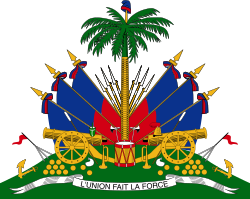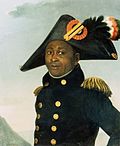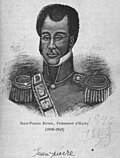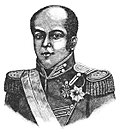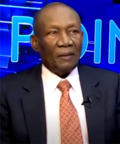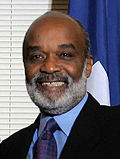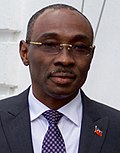| No. | Portrait | Name
(Birth–Death) | Elected | Term of office | Party | Title(s) |
|---|
| Took office | Left office | Time in office |
|---|
| 10 |  | Fabre Geffrard
(1806–1878) | — | 15 January 1859 | 13 March 1867 | 8 years, 57 days | Independent | President |
|---|
|
| — |  | Jean-Nicolas Nissage Saget
(1810–1880) | — | 13 March 1867 | 4 May 1867 | 52 days | Independent | Provisional President |
|---|
| 11 | 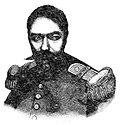 | Sylvain Salnave
(1827–1870) | — | 4 May 1867 | 27 December 1869 | 2 years, 237 days | Independent | President |
|---|
| 12 |  | Jean-Nicolas Nissage Saget
(1810–1880) | — | 27 December 1869 | 14 May 1874 | 4 years, 138 days | Liberal Party | President |
|---|
|
| — |  | Council of Secretaries of State | — | 14 May 1874 | 14 June 1874 | 31 days | Independent | Council of Secretaries of State |
|---|
| 13 |  | Michel Domingue
(1813–1877) | — | 14 June 1874 | 15 April 1876 | 1 year, 306 days | National Party [2] | President |
|---|
| 14 |  | Pierre Théoma Boisrond-Canal
(1832–1905) | — | 23 April 1876 | 17 July 1879 | 3 years, 85 days | Liberal Party | Provisional President (23 April 1876 – 17 July 1876)
President (17 July 1876 – 17 July 1879) |
|---|
|
| — |  | Public Order Committee | — | 17 July 1879 | 26 July 1879 | 9 days | Independent | [e] |
|---|
|
| — |  | Joseph Lamothe
(?–1891) | — | 26 July 1879 | 3 October 1879 | 69 days | Independent | Provisional President |
|---|
|
| — | 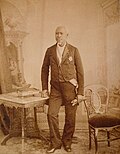 | Florvil Hyppolite
(1828–1896) | — | 3 October 1879 | 26 October 1879 | 23 days | National Party | Provisional President [f] |
|---|
| 15 |  | Lysius Salomon
(1815–1888) | — | 26 October 1879 | 10 August 1888 | 8 years, 289 days | National Party | President |
|---|
|
| — |  | Pierre Théoma Boisrond-Canal
(1832–1905) | — | 10 August 1888 | 16 October 1888 | 67 days | Liberal Party | Provisional President |
|---|
| 16 |  | François Denys Légitime
(1841–1935) | — | 16 October 1888 | 23 August 1889 | 311 days | Liberal Party | President |
|---|
|
| — |  | Monpoint Jeune
(1830–1905) | — | 23 August 1889 | 17 October 1889 | 55 days | Independent | Provisional President |
|---|
| 17 |  | Florvil Hyppolite
(1828–1896) | — | 17 October 1889 | 24 March 1896 | 6 years, 159 days | National Party | President |
|---|
| 18 |  | Tirésias Simon Sam
(1835–1916) | — | 31 March 1896 | 12 May 1902 | 6 years, 42 days | National Party | President |
|---|
|
| — |  | Pierre Théoma Boisrond-Canal
(1832–1905) | — | 14 May 1902 | 17 December 1902 | 217 days | Liberal Party | President of the Committee of Public Safety (14 May 1902 – 26 May 1902)
Provisional President (26 May 1902 – 17 December 1902) |
|---|
| 19 |  | Pierre Nord Alexis
(1820–1910) | — | 17 December 1902 | 2 December 1908 | 5 years, 351 days | Military | President |
|---|
|
| — |  | Commission for Public Order | — | 2 December 1908 | 6 December 1908 | 4 days | Independent | [g] |
|---|
| 20 | 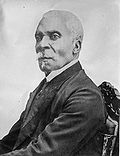 | François C. Antoine Simon
(1843–1923) | — | 6 December 1908 | 2 August 1911 [7] | 2 years, 239 days | Liberal Party | President |
|---|
| 21 |  | Cincinnatus Leconte
(1854–1912) | — | 15 August 1911 | 8 August 1912 [8] | 359 days | National Party | President [h] |
|---|
| 22 |  | Tancrède Auguste
(1856–1913) | — | 8 August 1912 | 2 May 1913 | 267 days | National Party | President |
|---|
| 23 |  | Michel Oreste
(1859–1918) | — | 12 May 1913 | 27 January 1914 [9] | 260 days | Independent | President |
|---|
|
| — |  | Edmond Polynice
(1855–1915) | — | 27 January 1914 | 8 February 1914 [10] | 12 days | Military | Provisional President |
|---|
| 24 | 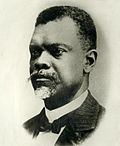 | Oreste Zamor
(1861–1915) | — | 8 February 1914 | 29 October 1914 | 263 days | Military | President |
|---|
|
| — |  | Edmond Polynice
(1855–1915) | — | 29 October 1914 | 6 November 1914 | 8 days | Military | Provisional President |
|---|
| 25 |  | Joseph Davilmar Théodore
(1847–1917) | — | 7 November 1914 | 22 February 1915 | 107 days | Military | President |
|---|
| 26 |  | Vilbrun Guillaume Sam
(1859–1915) | — | 25 February 1915 | 28 July 1915 | 153 days | Military | President [i] |
|---|
|
| — |  | Revolutionary Committee | — | 28 July 1915 | 11 August 1915 | 14 days | Independent | [j] |
|---|
| 27 |  | Philippe Sudré Dartiguenave
(1863–1926) | — | 12 August 1915 | 15 May 1922 | 6 years, 276 days | Independent | President [k] |
|---|
| 28 |  | Louis Borno
(1865–1942) | — | 15 May 1922 | 15 May 1930 | 8 years | Independent | President [k] |
|---|
| 29 |  | Louis Eugène Roy
(1861–1939) | — | 15 May 1930 | 18 November 1930 | 187 days | Independent | President [k] |
|---|
| 30 |  | Sténio Vincent
(1874–1959) | — | 18 November 1930 | 15 May 1941 | 10 years, 178 days | Independent | President [l] |
|---|
| 31 |  | Élie Lescot
(1883–1974) | — | 15 May 1941 | 11 January 1946 | 4 years, 241 days | Liberal Party | President |
|---|
| 32 |  | Franck Lavaud
(1903–1986) | — | 11 January 1946 | 16 August 1946 | 217 days | Military | Chairman of the Military Executive Committee |
|---|
| 33 |  | Dumarsais Estimé
(1900–1953) | 1946 | 16 August 1946 | 10 May 1950 | 3 years, 267 days | Liberal Party | President |
|---|
| 34 |  | Franck Lavaud
(1903–1986) | — | 10 May 1950 | 6 December 1950 | 210 days | Military | Chairman of the Government Junta |
|---|
| 35 |  | Paul Magloire
(1907–2001) | 1950 | 6 December 1950 | 12 December 1956 | 6 years, 6 days | Peasant Worker Movement | President |
|---|
|
| 36 |  | Joseph Nemours Pierre-Louis
(1900–1966) | — | 12 December 1956 | 3 February 1957 | 53 days | Independent | Provisional President |
|---|
|
| 37 |  | Franck Sylvain
(1909–1987) | — | 7 February 1957 | 2 April 1957 | 54 days | Independent | Provisional President |
|---|
|
| — |  | Léon Cantave
(1910–1967) | — | 2 April 1957 | 6 April 1957 | 4 days | Military | Acting President |
|---|
|
| — |  | Executive Government Council | — | 6 April 1957 | 20 May 1957 | 44 days | Independent | Executive Government Council |
|---|
|
| — |  | Léon Cantave
(1910–1967) | — | 20 May 1957 | 25 May 1957 | 5 days | Military | Acting President |
|---|
|
| — |  | Daniel Fignolé
(1913–1986) | — | 25 May 1957 | 14 June 1957 | 20 days | Peasant Worker Movement | Provisional President |
|---|
| 38 |  | Antonio Thrasybule Kébreau
(1909–1963) | — | 14 June 1957 | 22 October 1957 | 130 days | Military | Chairman of the Military Council |
|---|
